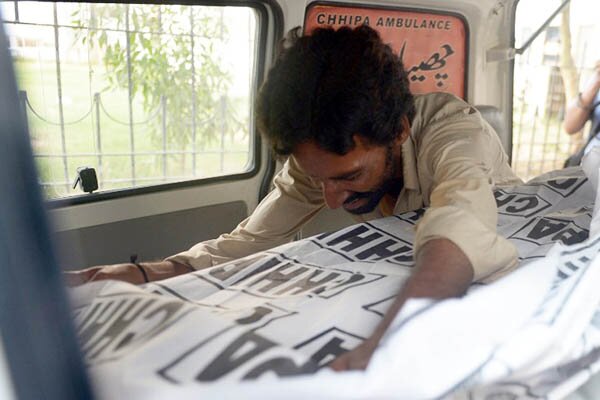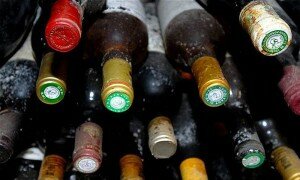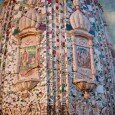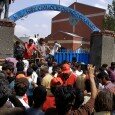By Amar Guriro –
Thirty two poisonous liquor victims of Karachi died not only with their sin and stupidity but also with the criminal neglect of state machinery particularly the greedy police
It was the second day of Eid-ul-Adha, the Islamic festival of sacrifice. Karachi was on a break from the routine hustle and bustle and most of the roads of the port city were deserted due to the public holiday. Everyone was busy sacrificing the remaining animals. Women were busy cooking traditional meat-dishes at home. Black kites were soaring and circling over the city to scavenge the offal of sacrificing animals thrown on roads.
Suddenly, the sirens of the ambulances broke the calm of the city. With sirens and revolving lights, these ambulances were carrying young men between 17 to 24 ages and were rushing to city’s biggest public hospital, which was named after country’s founder Muhammad Ali Jinnah, the Jinnah Hospital.
Lying on stretchers and held by crying relatives, these young men in critical conditions had consumed poisonous liquor. All of them were unconscious, their skins had turned blue and they were frothing and foaming at the mouth. Doctors at the emergency department of Jinnah Hospital were expecting patients with abdominal disorders as most of the people had consumed excessive meat on Eid but they started receiving young men who had consumed poisonous liquor, commonly named Katchi Sharaab.
On the evening of the first day of Eid, Jinnah Hospital authorities received three young men in the critical condition who had consumed poisonous liquor; one of them died in the night and others who were saved by the doctors lost their eyesight. On the next morning five more people were brought in the hospital. As the day passed, ambulances kept on bringing such more patients. Till the evening the hospital had received more than four dozens of such patients; some of them died in the way to the hospital and others who reached hospital were in critical condition.
Dr. Seemin Jamali, head of emergency department of Jinnah Hospital, where almost all the victims of the poisonous liquor were brought, said that most of the parents were so scared that they didn’t want to go through the legal proceedings or face the police. “As the days passed, we started receiving more and more liquor affected patients which pushed us to declared liquor emergency in the hospital and till the evening we had received more than four dozens of such patients,” Dr Seemin Jamali, deputy director of Jinnah hospital’s emergency told Pique. She confirmed 32 deaths; almost all of them were between 17 to 24 ages and all were Muslims, except one Christian.
Among these patients, Abdul Rahim 21 was also brought to the hospital in a critical condition. Though his life was saved but he lost his eyesight permanently. On Eid day, he and his friend Sabir bought a liter of locally but illegally produced liquor from a local manufacturer and after mixing it with a soft drink they consumed it while sitting in a small factory in their neighborhood where they both used to work. Sabir died before reaching hospital. “It was my first time, my friend said that we will enjoy,” Rahim said while crying.
Most of the parents of these victims, after getting confirmation of their deaths from hospital, took dead bodies silently to their homes without lodging any police case and even getting a postmortem conducted. In most of the cases the last ritual of ill-fated souls were performed only by the close family members as most of the people avoided attending their Namaaz-e-Janaza (Funeral Prayers). Muhammad Ashraf of Landhi town whose 24 year old son died after consuming fatal liquor said that the people did not attend funeral of liquor victims. “I never thought my son will die in this way that I will not even be able to arrange Fateh Khawani for the departed soul as people will not attend this because he died of a thing which is prohibited in religion,” he told Pique.
This was not the first time that such a large number of people had died due to the illegally made liquor. In 2007, more than 40 people died in Karachi after drinking contaminated liquor. According to Dr Seemin Jamali such cases are reported very often in Karachi. “Whenever there is any festival like Eid or Christmas, we receive such cases but the actual number of deaths can be much more as people prefer not to bring them to the hospital or to get them registered with the police,” she said.
Not in Karachi alone, but also in Hyderabad, the second largest city of Sindh, more than 20 people died during same period due to the toxic liquor consumption. The homemade liquor is famous in poor-urban-slums of city like Karachi and also in rural areas of Sindh where some of the manufacturers produce it with traditional method. One of these manufacturers told Pique on the condition of anonymity that all sorts of homemade liquor are not fatal. He claimed that the people died in Karachi and Hyderabad had not consumed traditional homemade liquor locally known as Thara but it was something else.
Revealing recipe of homemade liquor, he says that he and other manufacturers like him use babool tree bark, orange peels, raw molasses and in some cases tranquilizers bought from registered pharmacies and then they mix all ingredients, ferment it for more than a week and later it is cocked on a furnace and finally it is distilled to make traditional homemade liquor. “The homemade liquor can’t kill anyone as it is made naturally. However in recent cases, people consumed special liquor, which was made by mixing chemicals that a Lahore-based factory has recently introduced,” he claimed.
Though in majority of these deaths caused by poisonous liquor and reported at Jinnah Hospital Karachi parents refused for postmortem due to the social pressures. But in some cases in which Jinnah Hospital authorities had taken blood samples of victims for laboratory analysis showed that excessive use of methanol tainted with other chemicals caused these deaths.
Researcher Akhtar Baloch says that homemade liquor also known as Thara is not fatal as it is consumed almost every district of Sindh. “But for mass-level manufacturing of homemade liquor is not possible in city like Karachi as during process people in surrounding areas can smell it. Therefore in Karachi, mostly in poor areas, people mix special chemicals to produce this type of liquor as they have not any laboratory. Sometimes they increase the composition of certain chemicals that cause deaths,” he said.
Most of the victims of this lethal liquor in Karachi are from the poor or low income localities or slum settlements like Korangi, Landhi and other such areas of district Karachi East where right wing religious parties have strong influence and they are not allowing excise department to issue licenses for official liquor shop. Some people argue that in such case when there are more than 80 licensed liquor stores in the city, why don’t liquor addict of these areas go and buy from those stores. There are two reasons: first, it is costly and the residents of these areas can’t afford it, second, the most of the stores are located in distant areas and if anyone can afford it he faces the problem of liquor transportation.
According to the official record of Sindh Excise and Taxation Department there are 81 licensed liquor stores in Karachi city alone and according to a proprietor of such shops – Vijay Kumar – majority of the buyers on these shops are Muslims. As liquor consumption is against religious, social values in Pakistani society and publicly consumption of liquor is not tolerated therefore most of the alcohol addicts find no place to sit and drink it. One can find several people sitting in front of licensed liquor shops to drink while mixing it with soft drinks or in the mineral water bottles.
Some people argue that the consumers opt for homemade liquor on festivals due to shortage on licensed stores as the consumption of liquor on special days shoots manifold up. However, Sindh Minister for Excise Department, Giyanchand Essrani rejects such assumption. “There is always required amount of liquor available on these licensed shops but poor people prefer to consume illegal liquor which is fatal and we are trying to stop it,” he told Pique.
It is pertinent to mention here that in 1977 Islamic parties along with other political parties launched a movement against then Prime Minister Zulfikar Ali Bhutto and they also opposed bars and liquor shops. Bhutto banned alcohol just to save his government. Later, in 1979 former dictator Zia-ul-Haq had not only banned alcohol but also introduced severe punishment including 80 lashes of the whip for drinkers under strict Islamic laws. Therefore, after these laws, people moved to illegal manufacturing and consumption.
Renowned sociologist Professor Dr Fateh Muhammad Burfat thinks that changes in the traditional family system that always keeps check and balance on the young men in conventional societies, lack of recreational places, increasing poverty and absence of employment in the public sector are the major causes which have caused the mass level consumption of liquor and other addiction stuff among the people especially the youth. Prof. Burfat said that illegal liquor is manufactured under the supervision of police authorities.
This was confirmed by the official report prepared by a team which was constituted by police authorities followed by recent deaths in the city. The three-member committee led by SSP Investigation Karachi East Abdul Hameed Khoso has submitted a report which clearly states that Station House Officers (SHOs) in these poor slums patronize these dens where homemade liquor is manufactured. “Local police authorities supervised by SHOs and even in some cases DSPs are involved behind this homemade liquor manufacturing in Sharafi Goth, Mehran Town, Landhi and many areas of Korangi Industrial areas,” Khoso told Pique.
Burfat said until police is not willing liquor consumption will not be stopped. He suggests that political and religious parties, educational institutions and general society have to play their role to overcome this rapid growing trend of increasing alcohol consumption especially among the youth.
Amar Guriro is IVLP-Alumni and Karachi based journalist. He tweets @AmarGuriro































































































